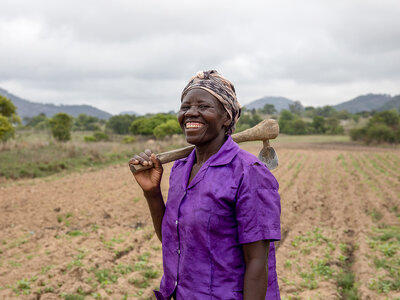Zimbabwe
- 42%
- of Zimbabwe's population lives in extreme poverty
- 26.7%
- of children have stunted growth
- 15.2 million
- population
Zimbabwe, a landlocked, low-income, food-deficit country in Southern Africa, is grappling with the effects of El Niño, exacerbating its semi-arid climate’s variable nature. An estimated 6 million people are expected to be food insecure in Zimbabwe during the peak of the 2024-2025 lean season from January to March.
In urban areas, high inflation, rising food prices and fluctuating exchange rates have affected families’ purchasing power and eroded their savings. 1.7 million people (35 percent of the urban population) will be food insecure in 2024.
The 2023 Global Hunger Index classified Zimbabwe's situation as serious. The country also ranked 159 out of 193 in the 2022 Human Development Index. Factors such as widespread poverty, the prevalence of HIV/AIDS, limited employment opportunities and recurrent climate-induced shocks contribute to food insecurity.
What the World Food Programme is doing in Zimbabwe
-
Social and humanitarian assistance
-
WFP provides food and cash transfers to communities affected by seasonal food insecurity, economic shocks and climate extremes in rural areas, cities and the Tongogara Refugee Settlement. We also support national institutions and civil society in improving delivery capacities for social protection programmes.
-
Urban resilience
-
Sustainable rural resilience
-
Institutional capacities
-
Service provision
In focus
‘Coronavirus destroys everything’
‘We can’t stay indoors or we’ll die of hunger’: Coronavirus fears mount for Zimbabwe’s urban poor
Zimbabwe in the grip of hunger
How drought is killing Zimbabwe
Japan pledges US$2.7 million to provide food assistance and strengthen community resilience in Zimbabwe
News release | 30 October 2019
Marching towards starvation
Faces of hope: Tongogara Refugee Camp in Zimbabwe
Helicopter for change
Zimbabwe news releases
Go to pageFind out more about the state of food security in Zimbabwe
Visit the food security analysis pageOperations in Zimbabwe
Contacts
Office
Block 1 Arundel Office Park,Norfolk Road, Mount Pleasant
Harare
Zimbabwe







